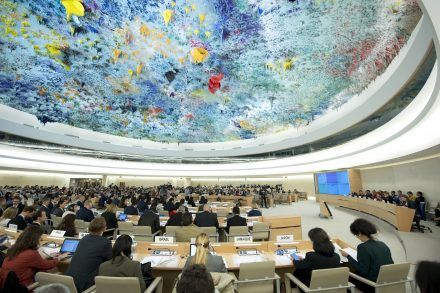COVID-19 response: UN must seize opportunity to protect rights of people in prisons

Today the highest human rights body of the United Nations starts in session as the COVID-19 pandemic continues to hit countries around the globe and presents threats to the health and life of people in contact with criminal justice systems. First on the agenda is a presentation of the UN High Commissioner for Human Rights, Michelle Bachelet’s annual review of human rights around the world and, notably, an oral update on human rights implications of COVID-19.
As governments went into prevent and response mode across the globe in March, the High Commissioner highlighted the dire need for urgent action to protect ‘catastrophic’ consequences for persons in detention, citing dangerous levels of overcrowding, unhygienic conditions and inadequate or non-existent health services. We now see reported infection cases among people in prison as high as 85,000 and around 1,500 deaths globally, although due to inaccurate and unreliable data the numbers are in fact much higher.
Penal Reform International calls on the Council to respond to the High Commissioner’s call by seizing the opportunity during this session and raising its voice to give greater attention to the violations suffered by the many people who come into contact with criminal justice systems. COVID-19 has exacerbated the crisis in which such systems were operating in.
‘Within the Council’s work to address human rights concerns in a time of the pandemic the Council must pay particular attention to people in contact with law enforcement and in places of detention’, said Olivia Rope, PRI’s Director of Policy and International Advocacy. ‘Their fate, at the hands of the state, reflects how well a government is responding to the pandemic. We cannot afford to forget about people in places of detention at this time.’
Highlights for PRI during the session of the Human Rights Council starting today include:
- The annual panel on technical cooperation will give a spotlight to ‘Upholding the human rights of prisoners, including women prisoners and offenders: enhancing technical cooperation and capacity-building in the implementation of the Nelson Mandela Rules and the Bangkok Rules’. This comes as a report documents efforts and initiatives the implementation of the UN Bangkok Rules as the 10-year anniversary since their adoption approaches, and similarly the 5-year anniversary of the Nelson Mandela Rules. PRI will sit on the panel to share good and concrete initiatives that have bought these rules to life and will also outline some of the key shortcomings. A joint statement by PRI and partners will call for action to address the disproportionate impact of drug policies on women.
- An enhanced interactive dialogue on the Philippines follows the publication of the significant report by the High Commissioner which detailed a range of violations in the context of anti-drug operations. This has included the fact that almost 9,000 people have been victims of extra-judicial killings since 2016 by law enforcement or vigilante groups – such killings were described by the report as having a “widespread and systematic character”. The killings are part of a broader war waged by the Government against the poor, and people who use drugs, which has led to an almost irreversible deterioration of the human rights situation in the country. Prison overcrowding rates of around 500% are proving to be fatal during the COVID-19 pandemic for people detained. PRI joins Harm Reduction International and IDPC, among others, in calling for an independent investigative mechanism.
- A discussion dedicated to COVID-19 and women’s rights is truly needed given the harsh impacts that the range of measures brought in with the pandemic have had on women. The Council should stay true to their resolve to not leave anyone behind and this includes addressing the specific and unique vulnerabilities faced by the approximately 750,000 women in prison around the world.
At the end of its last session just over a week ago, the Human Rights Council adopted a resolution on systemic racism, excessive use of force and other human rights violations by law enforcement against Africans and people of African descent. ‘The attention paid by the Council to criminal justice systems is welcome. The way it will include such systems in its response to COVID-19 will reflect its intention to build momentum for human rights-based approach and reform of criminal justice systems’, further commented Olivia Rope.
Follow us on Twitter @PenalReformInt for updates and commentary during the Human Rights Council.